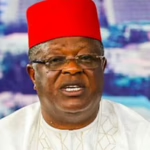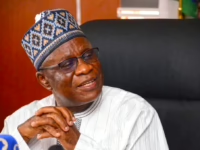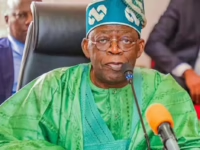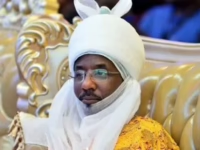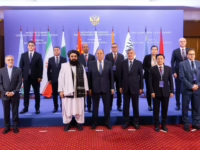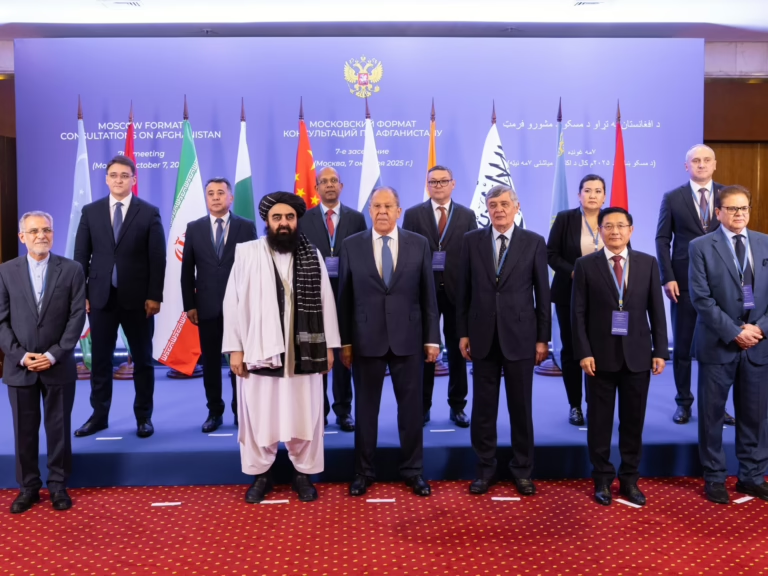Islamabad, Pakistan – During a September visit to the United Kingdom, United States President Donald Trump, seated beside British Prime Minister Keir Starmer, openly expressed his interest in reclaiming Bagram airbase in Afghanistan-a military site once under U.S. control nearly 8,000 kilometers (4,970 miles) away.
“We handed it over to the Taliban without any compensation. We want that base back,” Trump declared. Shortly after, he took to social media to emphasize his stance: “If Afghanistan refuses to return Bagram air base to the United States, serious consequences will follow!”
Unsurprisingly, the Taliban rejected this demand outright, asserting that under no conditions would they allow any foreign power to take control of the base.
On Tuesday, the Taliban, who have governed Afghanistan since their August 2021 takeover of Kabul, received a significant boost in their opposition to any U.S. military return. This support came from a diverse group of neighboring countries, many of which often have conflicting geopolitical interests.
At a summit held in Moscow, representatives from Russia, India, Pakistan, China, Iran, Kazakhstan, Tajikistan, Uzbekistan, and Kyrgyzstan joined Taliban officials in firmly opposing the establishment of foreign military bases on Afghan soil. Although the United States was not explicitly named, experts agree the message was clearly directed at Washington.
“They deemed unacceptable any attempts by nations to deploy military infrastructure in Afghanistan or its neighboring states, as such actions undermine regional peace and stability,” stated the joint communiqué released by the Russian Ministry of Foreign Affairs on October 7, marking the conclusion of the seventh Moscow Format Consultations involving Afghanistan’s neighbors.
Previously, Pakistan, China, Russia, and Iran had voiced similar opposition to “the reestablishment of military bases” during a declaration at the United Nations General Assembly last month. However, the Moscow statement united a broader coalition of countries-some with competing agendas-around a shared position.
Historically, India and Pakistan have competed for influence in Afghanistan, with India also wary of China’s expanding investments there. Iran has often viewed Pakistan’s presence in Afghanistan with suspicion. The Central Asian republics-Kazakhstan, Kyrgyzstan, Tajikistan, and Uzbekistan-have long been concerned about violence spilling over from Afghanistan. Meanwhile, Pakistan’s relationship with the Taliban has been complex, marked by decades of support followed by recent tensions.
Despite these differences, the consensus among these nations to exclude the U.S. military from Afghanistan reflects a collective belief that Afghan affairs should be managed regionally rather than by external powers, explained Taimur Khan, a researcher at the Institute of Strategic Studies Islamabad (ISSI).
“Regardless of their disputes, regional countries agree that Afghanistan must not host foreign military forces again,” Khan told Al Jazeera.
This unified stance not only bolsters the Taliban’s position against Trump’s demands over Bagram but also grants the Afghan rulers increased regional legitimacy. While Russia remains the only country to officially recognize the Taliban government diplomatically, most neighbors are expanding their engagement with Kabul.
A Strategic and Symbolic Asset
The Taliban’s return to power was set in motion in Doha in January 2020 during Trump’s first term, culminating in their takeover of Afghanistan in August 2021 under President Joe Biden’s administration.
Yet, in February of this year, shortly after beginning his second term, Trump insisted, “We intended to retain Bagram and maintain a small military presence there.”
Located 44 kilometers (27 miles) north of Kabul, Bagram airbase was originally constructed by the Soviet Union in the 1950s. Featuring two concrete runways-one stretching 3.6 kilometers (2.2 miles) and the other 3 kilometers (1.9 miles)-it remains one of the few Afghan sites capable of accommodating large military aircraft and heavy equipment.
Over the past five decades, Bagram has been a pivotal military hub for various occupying forces. After the 9/11 attacks, U.S.-led NATO forces took control of the base, making it central to America’s “war on terror.”
Afghanistan’s challenging mountainous landscape limits the availability of large logistical bases, which is why Bagram’s strategic value endures even four years after the U.S. military withdrawal.
Kamran Bokhari, senior director at the Washington, DC-based New Lines Institute for Strategy and Policy, expressed skepticism about any genuine U.S. plans to redeploy troops to Afghanistan despite Trump’s statements.
“The current U.S. geopolitical strategy emphasizes military downsizing. There is little appetite in Washington for such a complex and costly military commitment,” Bokhari told Al Jazeera. “Even if the Taliban consented to a U.S. return to Bagram, the expenses involved would outweigh the benefits.”
He also noted that the Moscow meeting served as a platform for Russia to reaffirm its influence in Central Asia, a region where its presence has been challenged by the war in Ukraine and China’s growing economic clout.
Concerns about renewed U.S. military involvement in Afghanistan extend beyond Russia and China. Iran, amid strained relations with the U.S. and Israel, is also opposed to any American military footprint in the region.
Other neighbors, including India and Pakistan, are keen to demonstrate their ability to manage the security vacuum left by the U.S. withdrawal. Although India has been a close U.S. partner, ties have cooled during Trump’s second term, partly due to tariffs and India’s continued oil imports from Russia.
Central Asian states sharing porous borders with Afghanistan fear that a U.S. military return could embolden militant groups and destabilize their territories.
Security Dynamics in Central Asia
The four Central Asian nations involved in the Moscow Format-Kazakhstan, Kyrgyzstan, Tajikistan, and Uzbekistan-alongside Turkmenistan and Afghanistan, form a cluster of six landlocked countries. Their geographic realities grant them a unique role in regional politics while compelling them to seek access to warmer ports for trade.
Experts argue that hosting a U.S. military base would be undesirable for many of these states.
“This opposition is not rooted in reflexive anti-Americanism,” explained Kuat Akizhanov, a Kazakh analyst and deputy director of the Central Asia Regional Economic Cooperation Institute (CAREC).
“A U.S. base would place host countries at the forefront of the U.S.-Russia-China rivalry. Both Moscow and Beijing have expressed their disapproval of renewed American military presence, and aligning with this consensus helps shield smaller economies from coercion or retaliatory measures,” Akizhanov told Al Jazeera.
He added that regional powers now favor multilateral frameworks like the Moscow Format or the Shanghai Cooperation Organisation (SCO), led by Russia and China, to address security and stability rather than relying on U.S. involvement.
Concerns of the Taliban and Regional Neighbors
Afghanistan’s larger neighbors harbor their own apprehensions.
“They worry that a renewed U.S. military presence could revive intelligence operations, exacerbate instability, and once again transform Afghanistan into a proxy conflict zone,” said Taimur Khan of ISSI.
“Regional countries now view Afghanistan as a space that must be stabilized through cooperative regional efforts and economic integration, rather than through renewed Western military intervention or strategic containment,” he added.
For the Taliban, Trump’s insistence on reclaiming Bagram presents a complex challenge, analysts say.
Ibraheem Bahiss, a senior analyst based in Kabul with Crisis Group, believes Trump’s demand stems more from his personal agenda than from a unified U.S. strategic policy. “There may be a feeling that Afghanistan remains unfinished business for him,” Bahiss told Al Jazeera.
For the Taliban, relinquishing Bagram is out of the question. “Handing over Bagram would alienate their support base and could provoke resistance against their government if the U.S. were to return,” Bahiss explained.
Simultaneously, Bokhari noted that the Taliban recognize international sanctions as a significant barrier to governance and economic recovery, necessitating engagement with the West, particularly the U.S.
“The Taliban seek sanctions relief, but the question remains: what concessions are they willing to make? Washington’s interest lies more in Central Asia, a region it struggles to access due to Russian, Chinese, and Iranian influence,” he said.
Trump has justified his desire to regain Bagram by citing its proximity to China and its missile manufacturing sites. Bagram lies approximately 800 kilometers (500 miles) from the Chinese border and about 2,400 kilometers (1,500 miles) from a missile facility in Xinjiang.
“Allowing China to dominate the region is not in America’s strategic interest,” Bokhari remarked.
In this context, Trump’s Bagram demand may signal a willingness from the U.S. to explore new diplomatic avenues with the Taliban, both analysts agreed.
Washington is not alone in reaching out to the Taliban, who were once widely isolated internationally. In fact, the Taliban have already made significant diplomatic progress within their neighborhood.
Diplomatic Engagement Without Formal Recognition
Since seizing control of Afghanistan’s 40 million population in August 2021, the Taliban have faced global skepticism regarding their governance approach.
Their administration enforces a strict interpretation of Islamic law, imposing numerous restrictions on women, including limitations on employment and education.
International sanctions have further strained an already fragile economy, while the presence of armed groups such as Tehreek-e-Taliban Pakistan (TTP), the Balochistan Liberation Army (BLA), and Islamic State Khorasan Province (ISKP) continues to alarm neighboring countries. The Taliban maintain they do not permit Afghan territory to be used for attacks against neighbors.
Pakistan, once considered the Taliban’s main supporter, has grown increasingly frustrated over the past four years with what it perceives as Kabul’s failure to curb militant activities.
In 2024, Pakistan experienced one of its deadliest years in nearly a decade, with over 2,500 casualties attributed largely to groups allegedly operating from Afghan soil-a claim Kabul denies.
Recently, several Pakistani soldiers were killed in an ambush by the TTP near the Afghan border in Khyber Pakhtunkhwa province.
Despite these tensions, Pakistan upgraded diplomatic relations with the Taliban in May. That same month, Afghanistan’s acting Foreign Minister Amir Khan Muttaqi met with his Pakistani counterpart, held phone talks with India’s foreign minister, and attended summits in Iran and China.
Muttaqi participated in the Moscow consultations that condemned Trump’s Bagram proposals and is scheduled for a historic weeklong visit to New Delhi, marking a significant thaw in India-Taliban relations, which were once hostile due to perceptions of Taliban as a Pakistani proxy.
Bahiss explained that regional countries’ engagement with the Taliban is driven by pragmatic objectives: maintaining border security, ensuring counterterrorism cooperation, and safeguarding trade routes.
Akizhanov added that increased regional interaction “normalizes communication channels with the Taliban and reinforces the narrative that the region’s future will be shaped locally, not by foreign military forces.”
However, he cautioned that “legitimacy remains conditional in each capital, dependent on guarantees regarding counterterrorism, border security, economic connectivity, and fundamental rights, especially for women and girls.”
Khan concurred, stating, “What we are witnessing is not formal recognition but a practical understanding that isolating Afghanistan benefits no one.”



